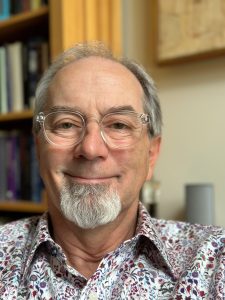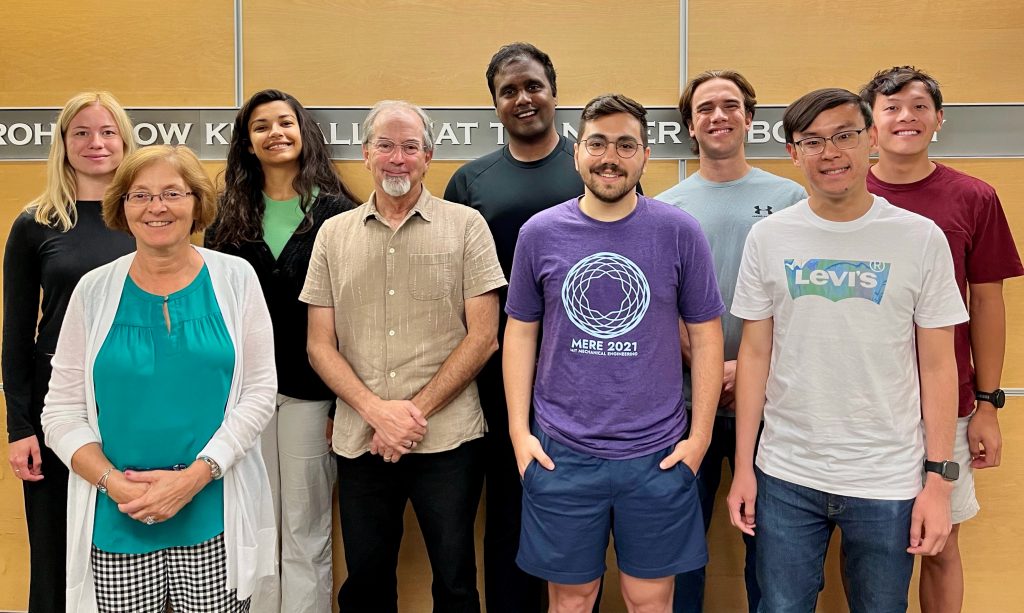
Lienhard Rsearch Group, August 2023. From left to right: Ulrike Wild, Christine Gervais, Margaux Frouté, John Lienhard, Akshay Deshmukh, Sam Heath, Jakob Wegmueller, Zi Hao Foo, Trent Lee.
On this page
John H. Lienhard V: John H. Lienhard V is Abdul Latif Jameel Professor and the Director of the Abdul Latif Jameel Water and Food Systems Lab at MIT. During more than three decades on the MIT faculty, Lienhard’s research and educational efforts have focused on water purification and desalination, heat and mass transfer, and thermodynamics. He has also filled a number of administrative roles at MIT. Lienhard received his bachelors (summa cum laude) and masters degrees in thermal engineering at UCLA from the Chemical, Nuclear, and Thermal Engineering Department, where he worked on thermal instabilities in solar collectors and evaporating meniscus measurements for desalination systems. He joined MIT immediately after completing his PhD in the Applied Mechanics and Engineering Science Department at UC San Diego, where he did wind tunnel measurements of spectra and cospectra in thermally stratified turbulent flow. Since coming to MIT, Lienhard has worked on desalination processes, liquid jet impingement, high heat flux engineering, electronics thermal management, and other topics. His research in desalination includes humidification-dehumidification desalination, membrane distillation desalination, forward and reverse osmosis, fouling and scale formation, electrodialysis, nanofiltration, management of high salinity brines, solar-driven desalination, thermodynamic and energy efficiency analysis of desalination cycles, and energy-water nexus issues. Lienhard has directly supervised more than 100 graduate theses and postdoctoral associates. He is the author of more than 300 peer-reviewed papers and has been issued more than 40 US patents.
Lienhard is a recipient of the 1988 National Science Foundation Presidential Young Investigator Award, the 1992 SAE Teetor Award, a 1997 R&D 100 Award, the 2012 ASME Globalization Medal, the 2015 ASME Heat Transfer Memorial Award, the 2019 ASME Edward F. Obert Award (in thermodynamics), and the 2022 AIChE Donald Q. Kern Award (for expertise in heat transfer, transport phenomena, and energy conversion). He is a Fellow of the American Society of Mechanical Engineers, the American Association for the Advancement of Science, and the American Society of Thermal and Fluid Engineers. He has been the Director of the Rohsenow Kendall Heat Transfer Laboratory since 1997. Lienhard is the co-author of textbooks on heat transfer, on thermal modeling, and on measurement and instrumentation. His heat transfer book has been available online at no charge since 2002, and hundreds of thousands of copies have been downloaded worldwide. His measurements book has sold more than 130,000 copies. He has created new courses on desalination, on thermal modeling, and on compressible fluid mechanics. He has also received several teaching and mentoring awards at MIT. Professor Lienhard was the founding director of the Center for Clean Water and Clean Energy from 2008 to 2017. He was also the founding director of the Ibn Khaldun Fellowship for Saudi Arabian Women from 2009 to 2017.
Lienhard holds Professional Engineering licenses in Massachusetts and Vermont.
Research Staff
Dr. Akshay Deshmukh: Akshay is a research scientist focusing on the development of physics-based models to design and optimize energy-efficient separations processes. His research interests center on building theory-based mass transport models for the permeation of nonideal multicomponent mixtures through nanoporous membranes and developing mathematical models to understand the physical phenomena underpinning membrane formation kinetics. His work aims to accelerate the development of new membranes and separations processes by building tractable heat and mass transfer models across the membrane, module, and system scales. Previously, Akshay developed thermodynamic process models for a novel membraneless water extraction process for hypersaline brine concentration using low-polarity solvents. He holds a PhD in Chemical & Environmental Engineering from Yale University, where he worked on modeling and optimizing membrane-based desalination processes, and a BA and MEng in Chemical Engineering from the University of Cambridge. Akshay also interned in the UK Parliament as an Ashok Kumar Fellow, coauthoring a briefing on nuclear security for MPs. In his free time, he enjoys playing cricket and reading about history and current affairs.
Christine Gervais: Christine has been Administrative Assistant to Professor Lienhard at the Center for Water and Clean Energy since 2012. Prior to joining the Center, she worked at MIT at the Deshpande Center. Christine has extensive experience working in both non-profits (YWCA and Center for Women & Enterprise) and for corporations (Gillette, Liberty Mutual). Christine began her career in Paris, France, at the International Astronautical Federation, organizing annual scientific conferences. She has been living in Boston since 1997 and enjoys working in an international environment, at MIT.
Recent Alumni
Dr. Zi Hao Foo: Zi Hao completed his PhD in the Mechanical Engineering and Computational Science & Engineering departments at MIT, where he combined experimental and computational approaches to investigate solvent- and membrane-based technologies for extracting critical materials and water from industrial brines and leachates. His research focused on optimizing advanced thermodynamic systems for dimethyl ether-driven brine concentration and fractional crystallization, extracting lithium from salt lakes using multilayered composite nanofiltration, and developing a closed-loop chemical manufacturing economy for lithium-ion batteries with electrodialysis. Prior to MIT, Zi Hao graduated with honors for highest distinction in Mechanical Engineering from Nanyang Technological University (NTU). He is now a postdoctoral researcher at the University of California, Berkeley, and will join NTU as an assistant professor in January 2027.
Dr. Danyal Rehman: Danyal was a PhD student in the Mechanical Engineering and Computational Science and Engineering departments at MIT. His research centered around the development and optimization of robust continuum models and physics-informed deep learning methods for multicomponent membrane transport. His work primarily focused on the design of new neural architectures that combine physics-based inductive biases and tailored transfer learning strategies for more accurate and generalizable ion transport modelling across diverse membranes. Previously, he received his Bachelor of Applied Science with High Honours in Mechanical Engineering from the University of Toronto, where he built, tested, and fine-tuned numerical methods for wind turbine layout optimization. He also previously interned at Flagship Pioneering as an AI/ML Fellow and at Pratt & Whitney as a Research Engineer. In his free time, he enjoys playing soccer and rock climbing. He is currently a postdoctoral associate at Mila AI under Yoshua Bengio.
Dr. Andrew Bouma: Andrew received his PhD from MIT in the Spring of 2022. His research has focused on using thermodynamic and economic analysis to improve the efficiency of desalination and brine concentration tools. His projects included comparing energy consumption of desalination technologies at both large scale and at separation interfaces. His work on evaluating and developing new membrane-based brine concentration technologies resulted in a patent application, one of several he co-authored while at MIT. He co-authored a report with colleagues at MIT and Stanford investigating the potential to incorporate large-scale desalination at the Diablo Canyon Nuclear Power Plant in California, which fueled discussions that led decision-makers to extend the life of the nuclear plant. While at MIT, he also received his MIT Graduate Certificate in Technical Leadership and was the Co-President of the MIT Water Club. Prior to joining the group, he received his B.S.E from Calvin University. In his free time he enjoys woodworking, playing sports, and sailing on the Charles River.
Dr. Yvana Ahdab: Yvana’s research addressed the use of brackish groundwater for greenhouse irrigation by treating the water with monovalent selective electrodialysis. She completed her SM at MIT on the minimum energy requirements for groundwater desalination in the continental United States. She also received an NSF Graduate Research Fellowship and became treasurer of MIT Women’s Initiative, marketing director of the MIT Energy Club, Vice President of the Lebanese Club at MIT, and a mechanical engineering department representative for Graduate Women at MIT. Prior to attending MIT, Yvana received her Bachelor of Science in Mechanical Engineering from Johns Hopkins University. As an undergraduate, she conducted research on the effects of chemical treatment and ocean currents on oil dispersion and worked on the development of an energy harvesting cooling device.
Dr. Quantum Wei: Quantum’s doctoral research concerned batch reverse osmosis. His Master’s research focused on the optimal system design and operation of two-stage reverse osmosis systems. Quantum was Co-President of the MIT Water Club and a member of the MIT Science Policy Initiative. Prior to joining the Lienhard group, Quantum received his SB at MIT in 2015 in Mechanical Engineering. He researched path-planning of underwater vehicles for his SB thesis. As an undergraduate, he also worked on the design and production of a satellite antenna deployment system and an adjustable prosthetic leg socket using granular jamming. Quantum enjoys playing sports and cooking in his free time.
Dr. Omar Labban: Omar received his PhD in 2020 for research on novel membrane cleaning technology and on nanofiltration. Omar completed his SM with the group on modeling novel nanofiltration hollow fiber modules operating under exceedingly low pressures for desalination pretreatment. At MIT, Omar received the Rasikbhai L. Meswani Fellowship and a Pappalardo fellowship. Omar holds a BS in Mechanical Engineering (summa cum laude) from the American University in Dubai, where he was also awarded the School of Engineering Undergraduate Program Award. Omar did his postdoc at NREL, and he now works at INTEL.
Dr. Hyung Won Chung: Hyung Won was a Masters and PhD student working on pressure-retarded osmosis (PRO) and high salinity desalination technologies such as membrane distillation. His prior research includes two-phase jet impingement cooling for electronic devices. He received his Bachelor’s of Science-Mechanical Engineering from University of Wisconsin-Madison with Highest Distinction (summa cum laude) He now works at OpenAI.
Dr. Kishor Nayar: Kishor completed his PhD in December 2018. He worked salt recovery from desalination brines, monovalent selective electrodialysis, and modeling how the thermo-physical properties of sea-water vary with pressure. Kishor received his B.Tech with Honors in Mechanical Engineering alongside a Minor in Energy Science from the Indian Institute of Technology Bombay (IIT-B), India. His primary research interests are in the field of clean energy and clean water. His past research includes work related to nanotechnology, heat transfer and thermodynamics.
Dr. Yagnaseni Roy: Yagnaseni (Urmi) completed her PhD in September 2018. Her work focused on transport through desalination membranes and how molecular-level understanding can better inform industrial-scale applications. Her entrancement with the nuances of ion transport through polymeric membranes began during her SM thesis work at MIT, when she applied modeling techniques from bio-chemistry to large-scale nanofiltration systems for desalination, leading to detailed insight on how various membrane and solution properties affect plant performance. While at MIT, Urmi held the position of Co-President of the MIT Women’s Initiative and remained passionate about other causes such as peer support, having been trained to be an iREFS@MIT and to lead meditation sessions. She received her Bachelor of Technology in Mechanical Engineering (B.Tech) at the SRM University, India as the top ranking student in her department. Urmi is currently a Postdoctoral Research Fellow at the University of Twente, working jointly with the Sustainable Process Technology and Membrane Science and Technology groups. She will soon join the Indian Institute of Science, Bangalore, as an assistant professor in the Centre for Sustainable Technologies.
Dr. Jaichander Swaminathan: Jai received his PhD in 2017 for his research on energy efficient design and operation of membrane distillation (MD) desalination systems for brine concentration. A key contribution of Jai’s research was the development of an integrated theoretical and analytical framework to describe the energetic performance of various MD designs. As a Master’s student in the group, Jai designed and carried out experiments to test membrane fouling. As a Tata Fellow and Post-Doctoral Associate, Jai worked on devising methods to reduce the cost of implementing zero liquid discharge in the textile dyeing units in India, based on nanofiltration. Prior to joining MIT in 2012, he obtained his Bachelor’s degree in Mechanical Engineering with a minor in Physics from Indian Institute of Technology Madras. Jai joined the faculty of Mechanical Engineering at Indian Institute of Technology Gandhinagar in July 2018, where he holds the Kanchan and Harilal Doshi Chair.
Dr. Amit Kumar Singh: Amit completed his postdoctoral studies in the Chemical Engineering Department at MIT, and then joined the Mechanical Engineering department as a research scientist from 2016-2018. He was also a postdoc fellow at Harvard University during his postdoc at MIT. He received his PhD from the Faculty of Bioengineering, Ghent University in Belgium. He has published 40 peer reviewed journal articles including papers in PNAS, Nature, and Science. He has received 25 major awards including the international doctoral dissertation award, and NAMS, IWA Biofilm Technologies, and Marie Curie awards, as well as several grants. He currently works as a biomanufacturing site lead at Moderna.
Dr. David Martin Warsinger: David did his PhD (2015) and postdoctoral work at MIT, where his research included energy efficiency, surface modification, and fouling of numerous desalination technologies, especially membrane distillation and reverse osmosis. One notable contribution from this work is the invention of the potentially most efficient desalination technology: batch reverse osmosis. David is an Assistant Professor of Mechanical Engineering at Purdue, in the Birck Nanotechnology Center. His research focuses on thermofluids and nanoengineering techniques related to water treatment. David is also a cofounder of Coolify, where he developed their prototype and helped win multiple pitch competitions. A dedicated teacher and adviser, David earned the 2015 MIT Outstanding UROP Graduate Mentor award. David also earned the Top of Class Outstanding Achievement Award for his Masters at Cornell University, where he also earned his Bachelors. (More information at warsinger.com).
Dr. Emily W. Tow: Emily received her PhD in 2017 following studies of membrane fouling in desalination systems, which included creating an apparatus to compare fouling in reverse osmosis, forward osmosis, and membrane distillation under identical hydrodynamic conditions. Emily earned her SB and SM at MIT in Mechanical Engineering with a minor in Art, Culture and Technology. While at MIT, Emily co-taught Advanced Heat Transfer, painted a mural in the basement of Building 16, and received an NSF Graduate Research Fellowship, a Martin Sustainability Fellowship, and the Meredith Kamm Memorial Award. Emily is currently at the Lawrence Berkeley National Lab to improve the energy efficiency of water reuse as an ITRI-Rosenfeld Fellow. After completing her fellowship, Emily will be merging her passions for engineering, teaching, and art as an Assistant Professor of Mechanical Engineering at Olin College.
Dr. Karim M. Chehayeb: Karim was a PhD and SM student in our group. His PhD research focused on the thermodynamics of electrodialysis. Specifically, he characterized and quantified the losses in electrodialysis for various applications. He also studied the optimal design and operation of different ED configurations. His Master’s research focused on the thermodynamic balancing of humidification-dehumidification through the use of a varying water-to-air mass flow rate ratio. Prior to joining the group, he received his Bachelor of Engineering in mechanical engineering from the American University of Beirut. He is now a consultant with the Boston Consulting Group.
Dr. Gregory P. Thiel: Gregory was a postdoctoral associate, Ph.D. (2015), and S.M. (2012) student with the group. His research included topics in energy efficiency and entropy generation minimization, heat and mass transfer, and wastewater chemistry. Outside the lab, Greg taught heat transfer and served in various roles in the MIT Water Club and the Graduate Association of Mechanical Engineers. He was named a Shapiro Teaching Fellow in 2016, and received the Martin Family Fellowship for Sustainability and an Eni-MIT Energy Initiative Fellowship. Greg holds a B.S.E. in mechanical engineering (2010), summa cum laude, from Case Western Reserve University. He currently works for ARPA-E. (More details at gregorythiel.com.)
Dr. Leonardo D. Banchik: Leo was a Ph.D. Candidate and NSF Graduate Research Fellow working to improve the performance of membrane-based desalination and water treatment technologies. As a Master’s student, he studied osmotic mass exchangers, such as reverse osmosis, pressure-retarded osmosis, and forward osmosis systems, for use in desalination, energy recovery and power production, and concentration or dilution processes. For his PhD work, Leo investigated the use of advanced membranes for highly efficient separation of oil-water streams. While not in the lab, Leo served on the leadership board of the MIT Water Club where he held the roles of club Co-President, Director of Content for the 2014 MIT Water Summit, and Co-Founder of the MIT Water Innovation Prize. Leo has received an S.M. in Mechanical Engineering from MIT and a B.S. in Mechanical Engineering, summa cum laude, from the University of Nevada, Las Vegas. He is now a consultant with McKinsey & Company.
Dr. Ronan K. McGovern: Ronan was a post-doctoral fellow, PhD, and SM student in our group, researching membrane based desalination technologies for high salinity feedwaters. He is a former Fulbright Science and Technology, MIT Martin Family and MIT Hugh Hampton fellow as well as a recipient of the International Desalination Association’s Channabasappa Memorial Scholarship, Best Paper Award for a Young Leader at the 2013 World Congress in Tianjin and the Ilya Prigogine Prize for Thermodynamics. Ronan has served as co-chair of the International Desalination Association’s Young Leaders Program. He has published in the areas of solar thermal energy, humidification-dehumidification desalination, ejector compressors, reverse osmosis, forward osmosis, electrodialysis and hybrid desalination systems. Ronan holds a Bachelor’s degree from University College Dublin and a Master’s and PhD degree from MIT, all in Mechanical Engineering. Ronan is now the founder and CEO of Sandymount Technologies, a start-up using technology from our lab.
Dr. Edward K. Summers: Edward completed his PhD with the group in 2013. His research focused on the design and optimization of membrane distillation (MD) based desalination systems for increased energy efficiency. The work included the development and testing of novel heating configurations and operating conditions for air gap MD systems. He earned his Master of Science degree in June 2010 with the group studying air heating solar collectors with integrated energy storage. Prior to joining the group, Edward earned his Bachelor of Science degree in mechanical engineering from the Massachusetts Institute of Technology.
Dr. Karan H. Mistry: Karan completed his PhD in 2013. His research focused on the irreversibilities and nonidealities in desalination systems. Specifically, he characterized the energy requirements associated with separation processes and identified how irreversible behavior and nonideal system behavior results in increased energy consumption. By combining thermodynamics, chemistry, and economics, he was able to characterize the cost implications of various sources of losses. Additionally, he spent some time modeling and optimizing large scale cogeneration water and power plants. Karan also completed his Master’s of Science with the group while studying humidification-dehumidification desalination cycles. Prior to joining the group, Karan earned his Bachelor’s of Science in mechanical engineering from the University of California, Los Angeles (UCLA). Currently, Karan is a consultant at the Boston Consulting Group. (More details at www.karanmistry.com)
Dr. Prakash Narayan Govindan: Prakash was a PhD student in the group, finishing in August 2012, and later a postdoctoral associate in the group. He was also a MIT Legatum fellow for the year 2010-2011. Prakash received the de Florez prize at MIT for graduate design and a best paper award at the IDA World Congress on Desalination and Water Reuse. His research experiences include pool boiling heat transfer studies of nanoparticle suspensions, thermodynamic design of combined cycle (gas and steam turbine) power plants, and thermal design of seawater desalination systems. He has co-authored more than 12 international journal publications and has filed more than 14 patent disclosures at the US PTO. He is now Vice President of Gradiant Corporation, a start-up which he co-founded with other members of the Rohsenow Kendall Lab.
Dr. Wilko Rohlfs: Wilko was a post-doctoral fellow from Germany funded by a grant of the German academic exchange organization (DAAD). His research at MIT focused on the mass transfer in channel flows with periodic spacer arrangements at low Reynolds numbers. Those flows are present in various membrane technologies, such as electro-dialysis or spirally wound membrane modules in modern reverse osmosis and nano-filtration installations. Wilko is research group leader at RWTH Aachen University focusing on convective transport processes. He is author and co-author of more than twenty peer-reviewed articles covering various areas in the field of free surface flow instabilities (liquid films and drops), heat transfer in jet impingement, as well as energy economics. Wilko holds a Ph.D. degree in Mechanical Engineering (2015, summa cum laude) and a PhD degree in Economics (2014, magna cum laude) from RWTH Aachen University, Germany. More details on his research can be found at wilkorohlfs.de.
Dr. Seongpil Jeong: Seongpil was a Postdoctoral Fellow funded by Korea Institute of Science and Technology (KIST) during 2013-14. Seongpil is interested in desalination process from pre-treatment to main separation process. Additionally, Seongpil has been studying membrane distillation for desalination of seawater and RO brines and for remediation of toxic heavy metal (Arsenic) in groundwater. Seongpil’s research at MIT concerned scaling phenomenon on membrane surfaces during the membrane distillation process. He received his Bachelors, Masters and Ph.D. degrees from Seoul National University. He now works as a research scientist at KIST.
Dr. Fahad Al-Sulaiman: Fahad is the director of the Center of Research Excellence in Renewable Energy & Center of Energy Efficiency, and a professor in Mechanical Engineering at King Fahd University of Petroleum and Minerals. His research focus is on the thermal, thermodynamic, and thermoeconomic (exergoeconomic) analyses of thermal systems based on solar thermal energy. He received his PhD from the University of Waterloo in 2010. He was a member of the group from September 2011 to July 2012.
Dr. Anand K. Plappally: Anand is a professor of Mechanical Engineering at the Indian Institute of Technology Jodhpur. His research experience includes analyzing different pathways of energy use for water supply, treatment/purification and reclamation. He received his PhD (Engr) from The Ohio State University in 2010. He has worked in the areas of Fluids, Material Science, Fracture Mechanics, and Probabilistic Methods in Structural Engineering. He had also worked in the area of Agricultural Water Management. Dr. Plappally was a member of the group from February 2011 to February 2012.
Dr. Mostafa H. Sharqawy: Mostafa is an associate professor in the School of Engineering at the University of Guelph, Ontario, Canada. His research experience include computational fluid dynamics, boiling heat transfer, thermal & membrane desalination, geothermal energy, solar energy, optimization, borehole heat exchangers, cooling towers, heat transfer in porous medium, thermophysical and transport properties, and thermoeconomic analysis. Dr. Sharqawy joined the group from 10/2008 to 8/2010 as a postdoctoral associate. He worked on various tasks related to solar desalination and seawater thermophysical properties. Please visit his personal website for more information.
Samuel Heath: Sam was a master’s (SM) student working to develop and analyze innovative desalination strategies for groundwater and irrigation applications. He has general research interest in the food-energy-water (FEW) nexus, with specific interests in desalination, water purification, and renewable energy applications. In May 2021, he graduated with highest distinction from Purdue University with a Bachelor of Science in Chemical Engineering and minors in Global Engineering Studies and Spanish. His past research has involved COVID-19 transmission modelling, water and soil analysis, and plant and cyanobacteria metabolomics.
Jakob Wegmueller: Jakob was a master’s student who worked on desalination and the application of bipolar membrane electrodialysis in agriculture. He graduated summa cum laude from Case Western Reserve University in May 2022 with a BSE in mechanical engineering and a secondary major in music. As an undergraduate, he aided in research on degradation modeling of photovoltaic modules and was a member of the CWRU robotics club. In his free time, Jakob enjoys playing trombone, learning bass guitar, as well as playing and watching baseball.
Ulrike Wild: Ulrike was a visiting student from ETH Zürich who worked on pharmaceutical removal from wastewater with electrodialysis. She will graduate with a Master of Science in Process Engineering from ETH after her visit at MIT. In 2021, she obtained her Bachelor’s degree in Chemical Engineering with high distinction from the University of Technology Berlin. Her previous research included water treatment with reverse osmosis and nanofiltration, and she also worked on graphene membrane fabrication for gas separation.
Georg Schücking: Georg was a visiting Master’s student from Lund University in Sweden working on brackish groundwater desalination using monovalent-selective electrodialysis (MSED) and MSED applications in greenhouses. He received his Bachelor of Science in Environmental Engineering from the Technical University of Munich in Germany, where he studied pathogen removal mechanisms in water filtration systems in the context of managed aquifer recharge. Georg’s research visit at MIT was funded by the Crafoord Foundation and the German Agency for International Cooperation (GIZ). Georg now works for BlueTech Research.
Michael Uggowitzer: Michael was a visiting Master’s student from the Swiss Federal Institute of Technology Zurich (ETH Zurich) in Switzerland. He is working on the development and verification of scaling models for sparingly soluble salts in batch reverse osmosis. Beside his project he is Co-President of MIT VISTA. He received his Bachelor of Science in Mechanical Engineering from ETH Zurich. Among other things, he previously worked with neural networks to analyse flow behaviour in aerospace applications.
Yoshiki Okamoto: Yoshiki was a visiting researcher from Toray Industries Inc., working on the efficiency of reverse osmosis process. He received his master’s degree in Chemical Engineering from Tokyo Institute of Technology in Japan. His research included modeling of mass transfer phenomenon in a dialyzer according to the flow condition. Then he joined Toray Industries Inc. and has been working mainly on RO and MBR technologies.
Fengmin Du: Fengmin was a visiting Master’s student from Technical University of Munich, Germany. There, he received his Bachelor of Science in Chemical Engineering in 2015. His research at MIT focused on recovery of caustic soda from high salinity reverse osmosis brine by membrane chlor-alkali electrolysis. He is a DAAD scholarship holder for his studies in Germany.
Xiaoyuan “Charlene” Ren: Charlene did her Environmental Engineering Master’s research on wastewater treatment technologies for small-scale pulp and paper mills in India, focusing specifically on a scalable solution to lignin removal for black liquor. She worked as a Tata Fellow funded through the MIT Tata Center for Technology and Design, a research center working on product and technology design for India. She received a Bachelor of Arts in Physics from Vassar College with Sigma Xi honors. She also founded MyH2O, a water quality mapping network in China.
Adam M. Weiner: Adam did his Master’s research on the design of electrodialysis and reverse electrodialysis systems. Prior to joining the group, Adam received a Bachelor’s of Science in Mechanical Engineering at Johns Hopkins University with a second major in Physics. As an undergraduate, Adam was honored as a Barry Goldwater Scholar and CoSIDA/Capital-One Academic All-American as a member of the varsity baseball team. Adam now works for Sandymount Technologies, a start-up using technology from our lab.
Lige Sun: Lige was a visiting Master’s student from RWTH Aachen University (Germany). She worked on the modeling and optimization of electrodialysis systems. She is a recipient of the Dr. Jürgen Ulderup Scholarship and a scholarship from the German National Academic Foundation. She now works for GE in Munich.
Mohamad H. Mirhi: Mohamad’s masters thesis research focused on wastewater remediation technologies and scale formation on heated surfaces. His work addressed problems related to purification technologies for water produced during oil recovery and water used during hydrofracking. Mohamad received his Bachelor’s of Engineering in Mechanical Engineering along with the Highly Distinguished Graduate Award from the American University of Beirut, Lebanon in June 2011, and his SM from MIT in June 2013.
Jacob Miller: Jacob pursued his Master’s degree while continuing to work part time at GE Aviation in Lynn, MA as a gas turbine design engineer. His research focused on the thermal balancing of desalination systems to reduce entropy generation and increase system efficiency. Prior to MIT, Jacob worked full time at GE Aviation and graduated from Yale University with a BS in Mechanical Engineering. Most recently, Jacob co-founded a start-up on combined evaporative and membrane HVAC technology, M2 Thermal Solutions.
Martin Sievers: Martin Sievers is a doctoral student at Stuttgart University, Germany. He obtained a B. Sc. in General Engineering Science and a Dipl.-Ing. in Mechanical Engineering from Hamburg University of Technology, Germany. In 2008/09 he was a visiting graduate student in the Department of Mechanical Engineering at the University of California at Berkeley and in 2010 in the Department of Mechanical Engineering at Massachusetts Institute of Technology. His research interests are power electronics cooling, heat exchanger design, and fluid dynamics of multi-component mixtures involving heat and mass transfer.
Kwan Yee Koo: Kwan Yee was a visiting student from Nanyang Technological University, expected to graduate in July 2020 with B.Eng (Honours, Highest Distinction) in Environmental Engineering. She worked on a project in batch reverse osmosis systems for her Bachelor Thesis. As a former student researcher at the Singapore Membrane Technology Centre, she studied the performance of sinusoidal spacers with protrusions in mitigating membrane fouling.
Steven Lam: Steven started as an undergraduate researcher in the summer of 2011, and received his Bachelor’s degree from MIT in 2012. He has focused on high effectiveness, low capex bubble columns to be used as humidifiers and dehumidifiers in HDH desalination plants. In a joint partnership with Dr. Govindan, he received the de Florez prize at MIT in Graduate Design for multistage bubble column dehumidifier. Steven currently works for Gradiant Corporation, a start-up founded by members of the Rohsenow Kendall Lab.
Maximus St. John: Maximus started as an undergraduate researcher in 2011 designing and building a humidification-dehumidification (HDH) desalination plant. He received his Bachelor of Science in Mechanical Engineering from MIT in 2012. His SB thesis was on packed bed humidifiers, for use in oilfield desalination systems. He now works for Gradiant Corporation, a start-up founded by members of the Rohsenow Kendall Lab.
Yoshio Perez: Yoshio worked in the lab as a UROP (Undergraduate Research Opportunities Program) while completing his Bachelor’s in Mechanical Engineer. His work consisted in finding efficient expanders that can work with low pressure ratios. He designed a test setup to show that a car turbocharger,K03, can work at low pressure ratios with a moderate efficiency. Prior to working with desalination, Yoshio worked with Volumetric Solar Collectors and Zeolite material in the Device Research Laboratory.
Group Photo Archive

Lienhard Research Group, February 2020. First row from left: Yvana Ahdab, Zi Hao Foo, John Lienhard, Danyal Rehman, Carson Tucker, Christine Gervais. Second row from left: Michael Uggowitzer, Andrew Bouma, Omar Labban, Akshay Deshmukh, Yoshiki Okamoto, Collin Renae, Georg Schücking. Photo credit: Tony Pulsone.
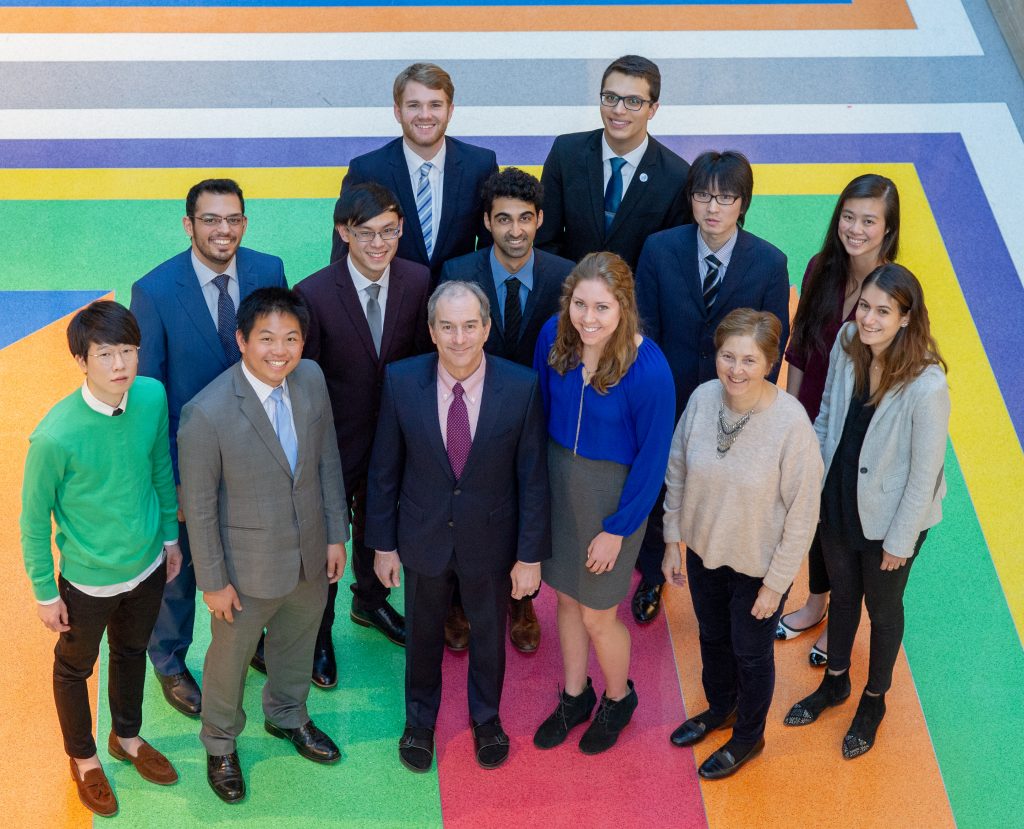
Lienhard Research Group, Fall 2019. First row from left: Hyung Won Chung, Quantum Wei, John Lienhard, Lara Ketonen, Christine Gervais, Yvana Ahdab. Second row from left: Omar Labban, Zi Hao Foo, Danyal Rehman, Yoshiki Okamoto, Priscilla Wu. Third row, from left: Andrew Bouma, Bryan Padilla. Photo credit: Tony Pulsone.
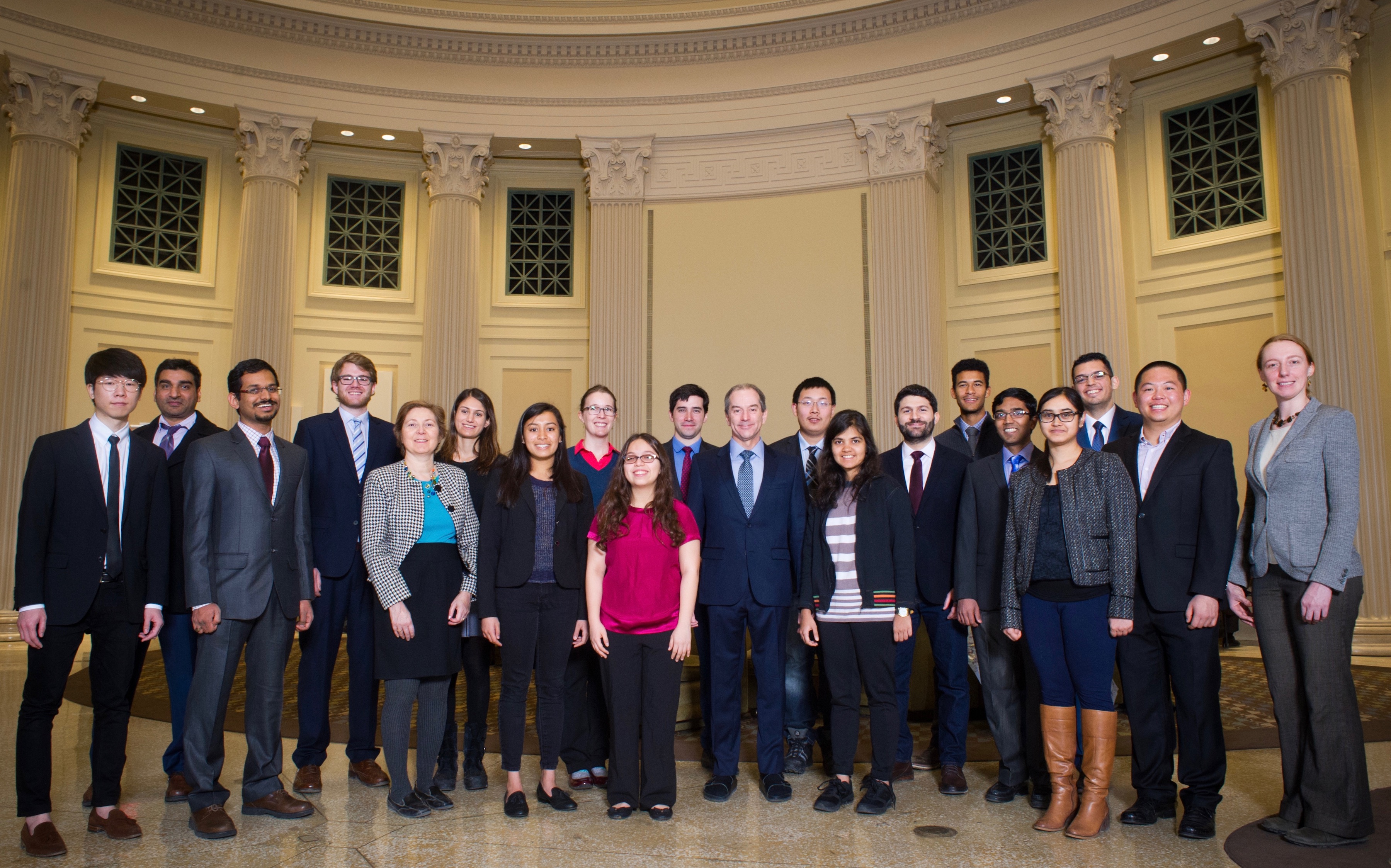
Lienhard Research Group, March 2017: Hyung Won Chung, Amit Kumar, Kishor Nayar, Andrew Bouma, Christine Gervais, Yvana Ahdab, Milani Chatterji-Len, Emily Tow, Elizabeth Vasquez, David Warsinger, John Lienhard, Fengmin Du, Tamanna Urmi, Karim Chehayeb, Pablo Polanco, Jaichander Swaminathan, Yagnaseni Roy, Omar Labban, Quantum Wei, Theresa Werth. Photo credit: Tony Pulsone.

Group members in December 2015. From left: Hyung Won Chung, Yvana Ahdab, Quantum Wei, Yagnanesi Roy, Kishor Nayar, David Warsinger, Greg Thiel, Karim Chehayeb, Omar Labban, John Lienhard, Leonardo Banchik, Wilko Rohlfs, Tamanna Urmi, Emily Tow, Luke Roberto, Christine Gervais, Ronan McGovern. Photo credit: Tony Pulsone.
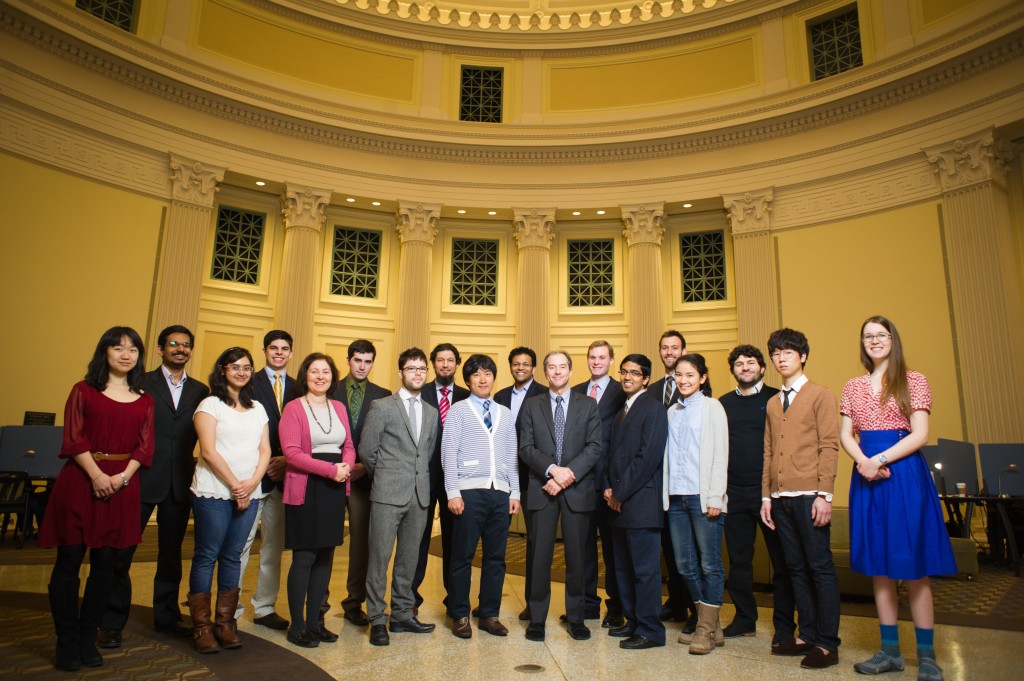
Lienhard Research Group, April 2014. From left: Charlene Ren, Kishor Nayar, Yagnaseni Roy, Adam Weiner, Christine Gervais, David Warsinger, Ronan McGovern, Bader Al Anzi (Kuwait University), Seongpil Jeong, Mohit Kansal, John Lienhard, Gregory Thiel, Jaichander Swaminathan, Leonardo Banchik, Lige Sun, Karim Chehayeb, Hyung Won Chung, Emily Tow. Photo credit: Tony Pulsone.
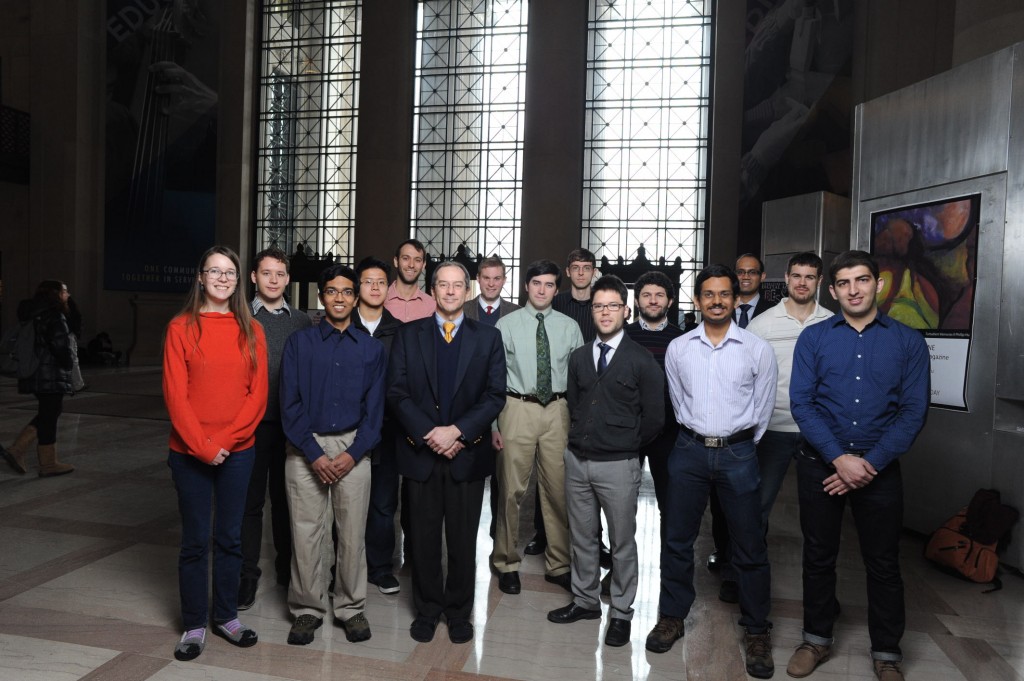
Lienhard Research Group, March 2013. From left: Emily Tow, Maximus St. John, Jaichander Swaminathan, Steven Lam, Leonardo Banchik, John Lienhard, Gregory Thiel, David Martin Warsinger, Edward Summers, Ronan McGovern, Karim Chehayeb, Kishor Nayar, Karan Mistry, Trevor Zinser, and Mohamed Mirhi.Photo credit: Tony Pulsone.
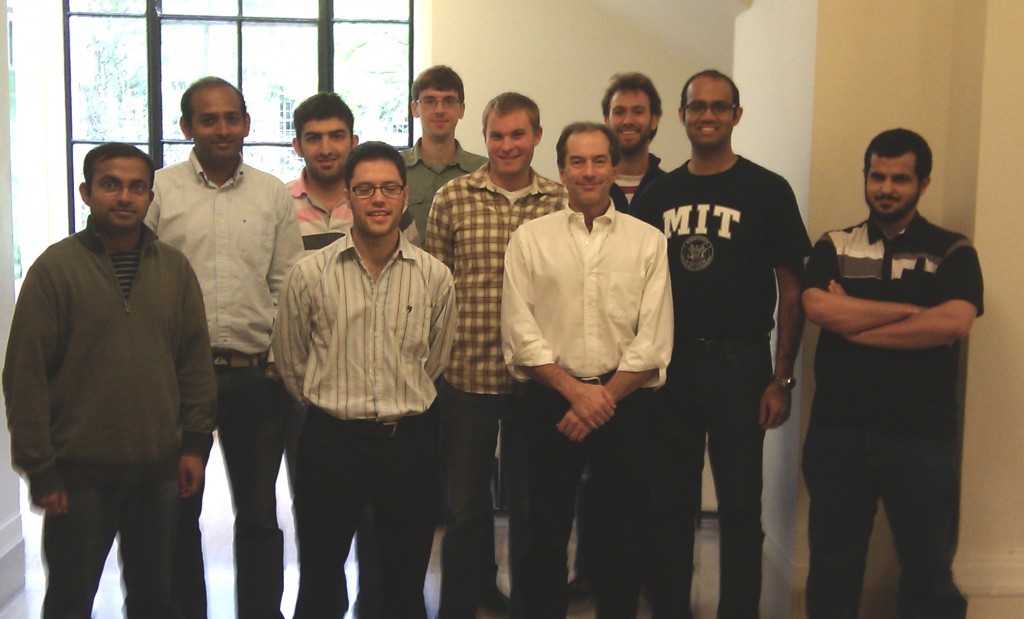
Lienhard Research Group in October 2011 (from left): Anand Plappaly, Prakash Narayan, Mohamad Mirhi, Ronan McGovern, Summers, Greg Thiel, John Lienhard, Leo Banchik, Karan Mistry, Fahad Al-Sulaiman
